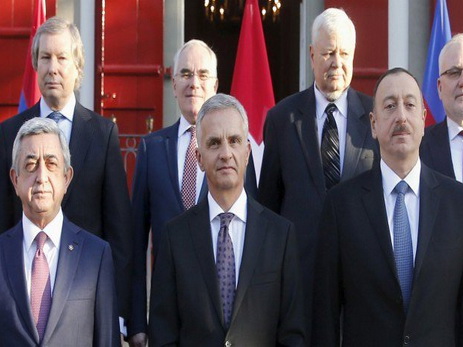DAILY CALLER: Why Azerbaijan Matters, To US And To NATO

As Europe drifts apart led by Great Britain’s vote to leave the European Union, the 67 year-old military alliance, the North American Treaty Organization (NATO) that ties the U.S., Europe and Turkey together is getting larger and more diverse. Led by the United States it adds new members almost every year.
Invited to attend the NATO Summit in Warsaw this year was Azerbaijani President Ilham Aliyev. Azerbaijan has been sending soldiers to Afghanistan ever since it joined United States forces in 2002 and remains today working with NATO coalition and American troops. It granted U.S. transit rights to Afghanistan since the very first day of the NATO’s Afghanistan operation.
NATO and the United States recognize that Azerbaijan sits in a strategic and crucial geographic place between Iran and Russia.
At the NATO summit, observer Naciye Selin Senocak (UNESCO’s Cultural Diplomacy Governance and Education, Center for Diplomatic and Strategic Studies), commented, “Azerbaijan proved its importance for NATO in Afghanistan and Kosovo.”
The Russian Foreign Minister – Sergey Lavrov — flew into Azerbaijan’s capital city Baku to talk. Ukrainian President Petro Poroshenko arrived in Baku for talks. Belarus and Azerbaijan are talking about military cooperation. Pope Francis is arriving in October. The United States’ top military man just finished a visit.
Azerbaijan is an important international geopolitical theater.
Azerbaijan, the Ukraine and other Eastern European countries are negotiating or finalizing Azerbaijani natural gas and petroleum deliveries to Eastern Europe even as the Ukraine petitions to join NATO.
Azerbaijan’s President Ilham Aliyev’s presence at the Warsaw Summit proves Azerbaijan’s importance.
With international attention, one festering sore continues to plague Azerbaijan. That is the occupation of a fifth of its territory by Armenia. This despite four separate United Nations Security Council resolutions demanding Armenian withdrawal from Azerbaijan territory.
The lowlight of the Armenian war on and occupation of Azerbaijan was the massacre of 600 men, women and children at Khojaly (February 1992), an Azerbaijan town.
Central to the Armenian invasion is the “secession” of Azerbaijan’s Nagorno-Karabakh region that was and is directed by Armenia. A settlement of the Nagorno-Karabakh issue is so vital the issue was discussed at the NATO Summit.
To understand why NATO, the U.S. and Azerbaijan want the Nagorno-Karabakh issue settled one must see the problem through American eyes and experience:
Americans need only look at history to understand what faces Azerbaijan. When southern states announced they were leaving the United States in April 1861, they raised armies and attacked the United States. The war lasted four years — 600,000 Americans died.
Just as United States growth and prosperity were sidetracked during its war, Armenia’s occupation of much of Azerbaijan forces it to provide for hundreds of thousands of displaced people who need to go home.
The United States defeated secessionists that tried to break away. Thus the U.S. brings a bloody history to the issue.
The United States knows that 20,000 Azerbaijanis were killed in this conflict before the 1994 cease fire and that a million Azerbaijanis, one-seventh of Azerbaijanis back then, were forcibly expelled from their homes.
Recent fighting took place entirely on Azerbaijani territory. According to the U.S. supported Radio Free Europe objective observers flatly state that Armenian soldiers and Armenian-supported “soldiers” of the secessionist Nagorno-Karabakh region instigated the April fighting.
As the invaded and victims of ethnic cleansing at Khojaly, Azerbaijanis have the moral high ground in the current conflict and talks. Another American experience is that its “secessionists” declared themselves “independent” like those in Nagorno-Karabakh which no country recognizes. In this they resemble “secessionists” from the United States. No one recognized them, either.
The United States, NATO and all European countries must support Azerbaijan in this renewed conflict because history dictates that support. The strength of NATO can be enhanced greatly with Azerbaijan.
While some Armenians say that Azerbaijanis will not be allowed back into their own territories for 50 years as noted in my book, Murder in the Mountains (Floricanto Press, 2016), the United States, France, Russia and now NATO must shepherd an agreement that requires Russian-supported Armenia to withdraw from Azerbaijani territory. That ends the problem.
Azerbaijan’s importance to the West is central to the future of the region as imagined by the U.S. and NATO.
Raoul Lowery-Contreras is the author of ‘Murder in the Mountains’














